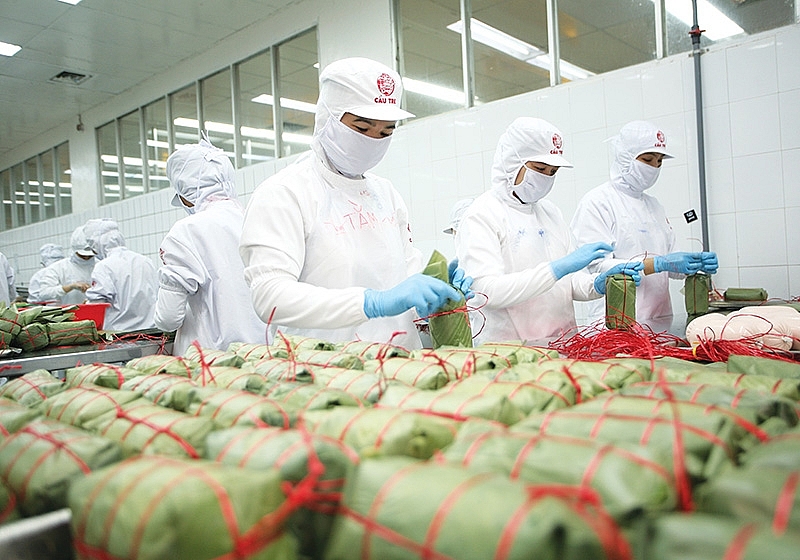How Vietnam can establish further economic successes
 |
| Raymond Mallon, senior economic advisor to the Australia-Vietnam economic reform programme |
When I first started working in Vietnam in the late 1980s (the early doi moi period), the economy was predominantly agricultural-based, with high rates of poverty and food shortages. Attempts at central planning had distorted economic incentives with hyper-inflation, limited private ownership, rudimentary infrastructure, and restrictions on domestic and international trade. Weak links to the outside world was stifling economic growth.
The opening up of the Vietnamese economy to the global economy, the development of more competitive domestic markets, and the introduction of private ownership and market-based incentives helped accelerate improvements in investment, productivity, incomes, and living standards. The subsequent rapid reduction of poverty has been the most remarkable outcome of the reform process.
Vietnam has since moved from a low income, closed economy to an increasingly dynamic mixed economy via transfer of technology, capital, skills, and know-how. The economy has diversified away from mostly unprocessed natural resource-based commodities, with strong growth in the assembly and production of increasingly more sophisticated manufactured goods and robust growth in tourism, education, and health services.
From a relative unknown in global markets, Vietnam is emerging as an increasingly visible and reputable international supplier of goods and services. With rapid growth in industry and services, urbanisation has accelerated providing scale economies for businesses and delivery of public services. Encouragingly, urban clusters are emerging along multiple transport corridors rather than being limited to one or two mega-cities. Sustained robust economic growth has enabled increased tax revenues, facilitating increased expenditure on essential public services and infrastructure. This has allowed Vietnam to build on earlier comparatively strong performance in terms of national education, health and other indicators of social development, and to increase investment in previously poor levels of infrastructure development and maintenance. The net result is that the economy is now providing a much greater variety of more productive (and higher income) employment opportunities.
While the informal sector remains large, an increasing share of the workforce is able to access formal employment opportunities with less income variability and risk, and/or lack of social protection that typically characterises the informal sector. However, Vietnam’s strong growth and urbanisation has also increased environmental, congestion, and social pressures. And Vietnam’s strong integration with the global economy leaves it more vulnerable to the impact of economic shocks.
 |
| Vietnam’s economy has changed vastly for the better since the wide-ranging reforms of the mid-1980s. Photo: Le Toan |
Transformative policies
Vietnam’s economic transformation was enabled by a shift towards market-based allocation of resources, increasing access to international markets, and the relatively equitable distribution of factors of production. Public delivery of social services was – and continues to be – remarkably effective with levels of life expectancy and basic education (literacy and numeracy) that are relatively high for a country with Vietnam’s modest per capita income. Also, initial reforms provided many households with relatively equitable distributed rights to use agricultural land.
This, along with a relatively healthy, young, and motivated workforce, provided a solid foundation for growth as reforms progressed. Vietnam’s geographic proximity to rapidly growing economies, combined with political and economic stability, an improving regulatory environment for investment and trade, and a strong commitment to support individual advancement and innovation have also helped. The remarkably successful macro-economic stabilisation programmes in the late 1980s and early 1990s were also critical to attracting the investment needed for sustained growth.
Foreign investment was an important driver of economic and trade growth during much of this transformation. Large flows of international investment, trade and technology were facilitated by Vietnam’s increasing participation in existing and proposed international economic co-operation agreements, notably the World Trade Organization, the ASEAN Economic Community, the Comprehensive and Progressive Agreement for Trans-Pacific Partnership, the EU-Vietnam Free Trade Agreement, and the Regional Comprehensive Economic Partnership. More recently the government has focused on facilitating domestic private investment. Reforms to reduce business licensing and conditions, and to streamline administrative procedures, combined with increasing high-level recognition of the contribution of the private sector, have helped stimulate increased private investment.
The domestic private sector has developed, replacing foreign investment as the major source of business investment and export growth in recent years. Nevertheless, domestic private corporations still account for a relatively small share of economic output. Recent private sector performance is a positive development in terms of sustainable and equitable economic development because domestic investment is less likely to be less impacted by external shocks, and is more likely to be invested outside the major growth centres.
Domestic private investment also tends to be less capital intensive and create relatively more jobs per unit of investment. Economic reforms have also focused on promoting competitive neutrality, with the aim of ensuring that all enterprises compete on a level playing field. Reforms towards unified enterprise and investment legislation, more market-based allocation of land and capital, a national competition policy, and more open public procurement have helped level the playing field, but some state-owned enterprises and large private investors still receive preferential treatment in terms of access to land, capital, and policy incentives.
Sustaining the reform process
Many Vietnamese workers continue to be employed in the relatively low productivity informal sector, either as household businesses or informal workers. Renewed efforts to reduce regulatory and administrative impediments, and to accelerate shifts to e-government, could help boost formalisation.
More generally, building an easily accessible, responsive and client oriented public service, and stronger and more accessible market institutions will provide more incentives for business to formalise operations.
Vietnam continues to move into higher value components of production networks, including the more creative elements of value chains. There is long-term potential for increased and more productive service sector employment, including in education, healthcare, IT and automation, logistics, retail, and hospitality. With the coronavirus causing major disruptions, government policies should be designed to help firms restructure rather than to sustain models of service delivery that may not be viable in the longer term.
It remains important to encourage increased investment in innovation, with greater collaboration between industry and researchers. Targeted protection of intellectual property rights may encourage increased investment in research and development. Increased investments in IT and the adoption of international good practice to govern IT, e-commerce, cross-border trade, data protection, and content providers could also help boost productivity growth.
Links between domestic and foreign enterprises need to be further strengthened. Accelerated growth in medium- and larger-size firms would help, as larger businesses are more likely have the scale and management systems needed to partner with foreign investors. It will also be important to sustain efforts to build strong market institutions, including independent regulators, competitive factor markets, and economic courts.
The skills needed by investors and society are changing. There is a need for a renewed focus on the equitable provision of best quality basic education, foreign languages, university and vocational education, and life-long learning to better meet the changing needs of society and to ensure that the benefits of economic development are more equitably shared. Policymakers and businesses also need to focus more on incentives to attract and retain the best possible talent to stay in and/or move to work in Vietnam. Vietnam has made tremendous progress in promoting gender equity with high levels of female workforce participation. However, there remain major gender gaps in productivity, incomes, and ownership of formal businesses. Reducing these gaps could have a substantive impact in boosting productivity growth.
Vietnam’s strong growth has increased environmental, congestion, and social pressures. In addition to the social costs, this is undermining investment opportunities.
While increased urbanisation is generating scale economies that could help boost productivity, Vietnam’s strong growth has increased environmental, congestion, and social pressures, thus undermining investment potential. More investment in urban and regional infrastructure development and environmental protection is needed to ameliorate these adverse impacts. And greater attention should be given to improving and enforcing national environmental safeguards.
While climate change and global protectionism were obvious risks at the beginning of 2020, the current pandemic illustrates how important healthcare and disease prevention is in our increasingly interconnected world. Despite these uncertainties, I remain optimistic about Vietnam’s long-term economic prospects.
Vietnam has proven remarkably adept at monitoring and responding to global shocks. A continuing commitment to equitable development, evidence-based policymaking, and to responding quickly in the medium- and long-term national interest should help ensure that Vietnam continues to prosper in an uncertain international environment.
What the stars mean:
★ Poor ★ ★ Promising ★★★ Good ★★★★ Very good ★★★★★ Exceptional
Related Contents
Latest News
More News
- Foreign leaders extend congratulations to Party General Secretary To Lam (January 25, 2026 | 10:01)
- 14th National Party Congress wraps up with success (January 25, 2026 | 09:49)
- Congratulations from VFF Central Committee's int’l partners to 14th National Party Congress (January 25, 2026 | 09:46)
- 14th Party Central Committee unanimously elects To Lam as General Secretary (January 23, 2026 | 16:22)
- Worldwide congratulations underscore confidence in Vietnam’s 14th Party Congress (January 23, 2026 | 09:02)
- Political parties, organisations, int’l friends send congratulations to 14th National Party Congress (January 22, 2026 | 09:33)
- Press release on second working day of 14th National Party Congress (January 22, 2026 | 09:19)
- 14th National Party Congress: Japanese media highlight Vietnam’s growth targets (January 21, 2026 | 09:46)
- 14th National Party Congress: Driving force for Vietnam to continue renewal, innovation, breakthroughs (January 21, 2026 | 09:42)
- Vietnam remains spiritual support for progressive forces: Colombian party leader (January 21, 2026 | 08:00)

 Tag:
Tag:


















 Mobile Version
Mobile Version